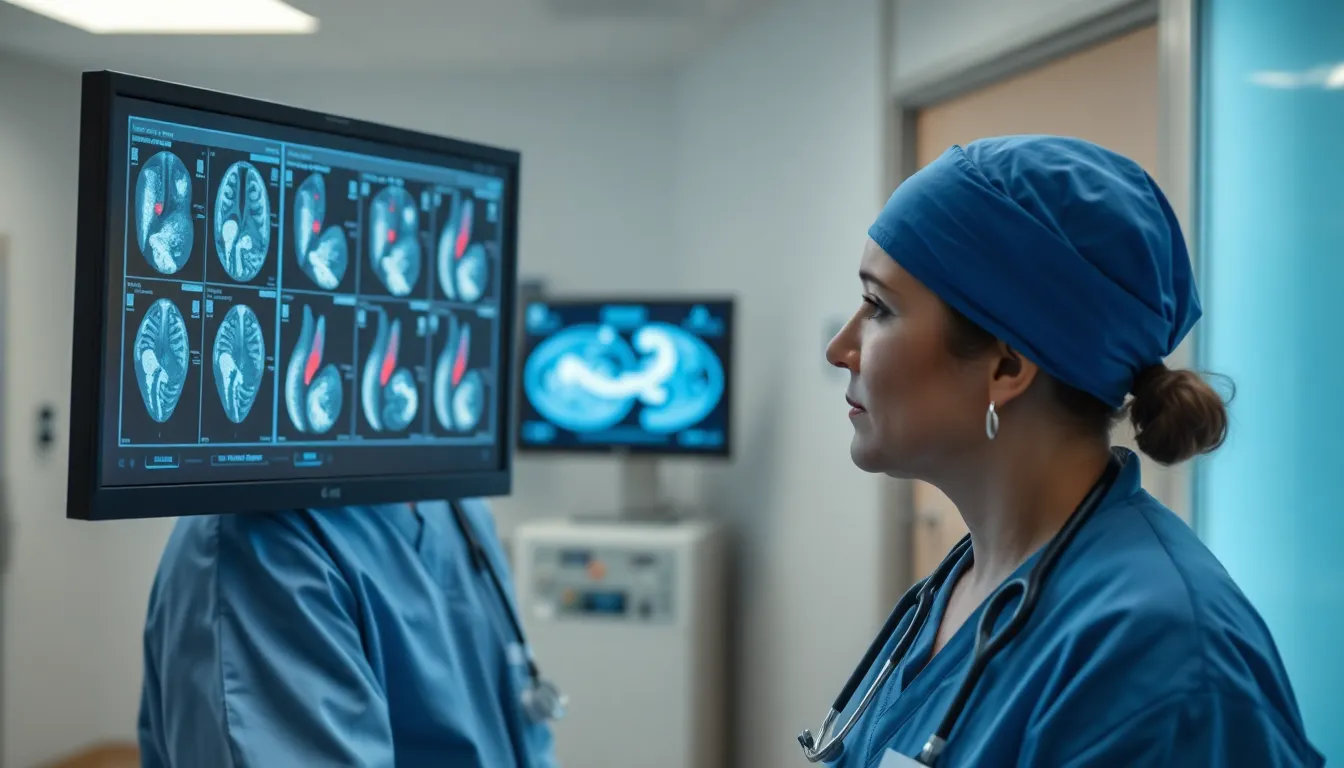Table of Contents
ToggleIn a world where even your toaster can be smarter than your average bear, it’s no surprise that healthcare is getting a serious tech upgrade. Enter AI-powered diagnostics, the superhero of the medical field, swooping in to save the day with lightning-fast accuracy and efficiency. Imagine a world where doctors have a trusty sidekick that can analyze data faster than you can say “artificial intelligence.”
Overview of AI-Powered Diagnostics
AI-powered diagnostics represent a groundbreaking shift in healthcare technology. These systems employ advanced algorithms to analyze medical data, leading to faster and more accurate patient assessments. Machine learning models process vast amounts of data from various sources, including medical images, patient records, and laboratory results.
Innovative tools such as deep learning networks enhance diagnostic accuracy in fields like radiology and pathology. Many hospitals now integrate AI solutions, streamlining the diagnostic process while alleviating the burden on healthcare professionals. AI applications assist in identifying conditions like cancer, heart disease, and neurological disorders with remarkable speed.
Robust analytics capabilities enable real-time data interpretation. Algorithms continuously learn from new data, refining their accuracy over time. Healthcare providers benefit from AI-assisted insights that guide treatment decisions, improving patient outcomes.
Various companies lead the development of AI diagnostics tools, transforming traditional practices. For instance, IBM Watson Health and Zebra Medical Vision create systems that reduce diagnostic errors. These technologies revolutionize how doctors evaluate patient conditions, enhancing overall healthcare efficiency.
As reliance on AI grows, the potential for early disease detection increases significantly. Incorporating AI into diagnostics allows for proactive health management, identifying issues before they become critical. This ongoing evolution shapes the future of medicine, emphasizing the importance of integrating AI technologies in clinical settings.
Benefits of AI-Powered Diagnostics

AI-powered diagnostics offer numerous advantages, revolutionizing the approach to healthcare. These benefits contribute to improved patient outcomes and increased efficiency in medical practices.
Improved Accuracy
Enhanced accuracy defines AI diagnostics. Algorithms analyze intricate patterns within medical data, yielding reliable results. These systems significantly reduce the likelihood of human error. For example, in radiology, AI tools can identify subtle anomalies that a human eye might overlook. Studies demonstrate that AI can improve diagnostic accuracy by 15% to 20% in some cases. Physicians benefit from access to a second opinion, leading to better-informed decisions. Effective utilization of AI also helps in early detection of severe conditions, enhancing the chances of successful treatment.
Speed of Diagnosis
AI enhances the speed of diagnosis across various medical fields. Rapid data processing allows for immediate analysis of imaging studies and lab results. Traditional diagnostic methods consume substantial time, often delaying critical treatment. In contrast, AI can deliver results in minutes, not hours or days. This accelerated diagnosis plays a crucial role during emergencies, where timely interventions can save lives. Hospitals adopting AI diagnostic tools report a 30% decrease in turnaround times. Increased speed without sacrificing quality ensures that patients receive the care they need promptly.
Challenges in Implementing AI-Powered Diagnostics
Implementing AI-powered diagnostics presents several challenges that must be addressed to maximize their potential in healthcare.
Data Privacy Concerns
Data privacy concerns arise when handling sensitive medical information. Patients often worry about how their data is used and stored. Ensuring compliance with regulations like HIPAA is critical. AI systems need robust security measures to protect patient data from breaches. Transparency in data usage fosters trust between patients and healthcare providers. Encryption methods offer additional layers of security for sensitive information. Organizations must also establish clear data governance policies to manage access and sharing effectively. Without addressing these concerns, resistance from stakeholders may hinder the adoption of AI solutions.
Integration with Existing Systems
Integration with existing systems poses a significant challenge for healthcare facilities. Many hospitals rely on outdated infrastructure that may not support advanced AI technologies. Compatibility issues often arise when merging AI solutions with electronic health record systems. Successful integration requires careful planning and assessment of current IT frameworks. Stakeholders must collaborate to design workflows that incorporate AI diagnostics seamlessly. Training staff on new tools is equally vital for minimizing disruption. Without thoughtful integration, the potential benefits of AI in diagnostics may remain unrealized.
Future Trends in AI-Powered Diagnostics
AI-powered diagnostics continue to evolve, shaping the future of medical assessments significantly. The future trends indicate a deeper integration of AI technologies across various healthcare sectors.
Advancements in Machine Learning
Innovations in machine learning promise to enhance diagnostic capabilities further. New algorithms focus on improving pattern recognition in complex datasets, leading to even higher accuracy rates. Techniques like transfer learning enable models to apply knowledge from one medical domain to another, enhancing efficiency. These advancements allow for real-time diagnostic evaluations, transforming the patient experience. Many healthcare facilities are already piloting these new systems to validate their effectiveness. These developments suggest a shift towards personalized medicine, where AI tailors diagnostics to individual patient profiles.
Potential Impact on Healthcare
AI-powered diagnostics are expected to revolutionize healthcare delivery. Early detection of diseases continues to be a major benefit, with technology identifying potential risks before they become critical. A reduction in diagnostic errors leads to improved patient safety outcomes and effectively reduces treatment costs. Healthcare professionals can rely on AI to streamline workflows, allowing them to focus on patient care rather than administrative tasks. Patients benefit from quicker turnaround times, enhancing their overall healthcare experience. Predictions suggest that as AI becomes more ubiquitous, it could lead to a more proactive approach to healthcare management, ultimately saving lives.
AI-powered diagnostics are reshaping the landscape of healthcare by enhancing the speed and accuracy of medical assessments. As these technologies continue to evolve they promise to revolutionize patient care through early detection and personalized treatment plans. The integration of AI not only streamlines workflows for healthcare providers but also empowers them to make more informed decisions.
While challenges like data privacy and system compatibility remain significant the potential benefits far outweigh the obstacles. Embracing AI in diagnostics represents a crucial step toward a more efficient and effective healthcare system. As the future unfolds the role of AI in healthcare will only grow more prominent leading to improved patient outcomes and a proactive approach to health management.




